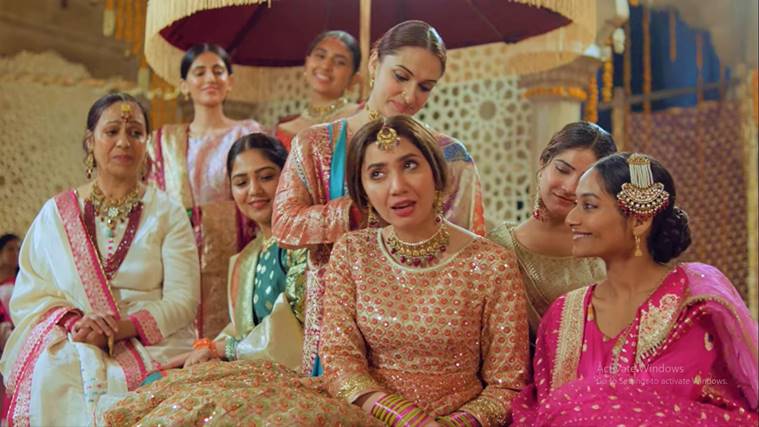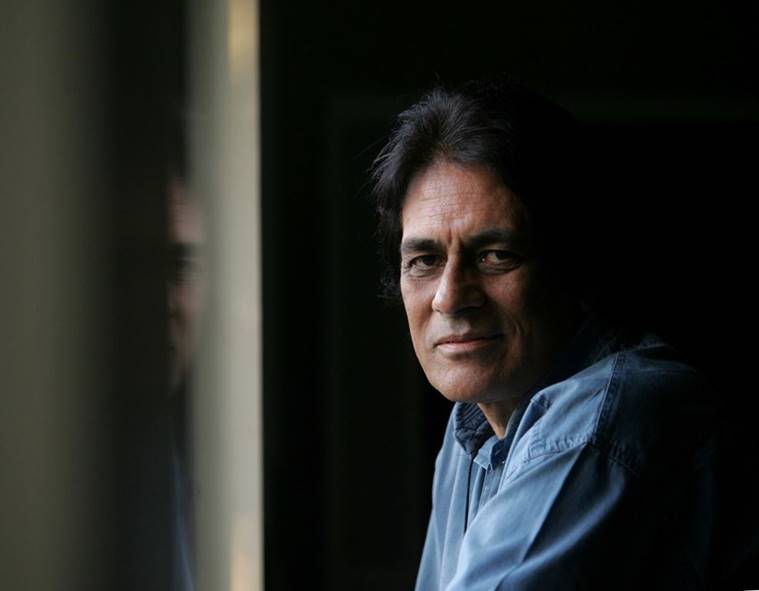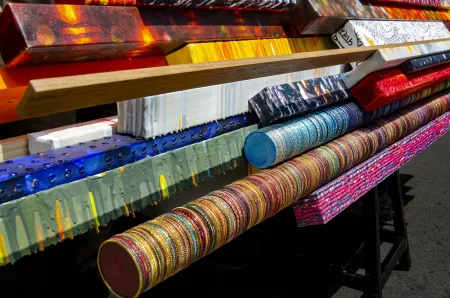- India
- International
A Pakistan woman’s ‘dua’ against domestic violence, marital rape, echoes in India
A revamped version of Allama Iqbal's 'Lab pe aati hai dua' in Pakistan finds resonance in India
 Mansoor’s ‘Dua-E-Reem’ (A Prayer of A Woman), a video song of nearly 7 minutes with actor Mahira Khan in the lead, is set in pre-partition era (Screen grab)
Mansoor’s ‘Dua-E-Reem’ (A Prayer of A Woman), a video song of nearly 7 minutes with actor Mahira Khan in the lead, is set in pre-partition era (Screen grab)
More than a century after Muhammad Iqbal’s Lab pe aati hai dua became a household nazm in undivided India, a revamped version of it, in the form of a woman’s ‘dua’ (prayer) against domestic violence, marital rape and seeking gender equality in a marriage, has risen from Pakistan.
Sample this: “Lab pe aati hai dua banke tamanna meri, ghar to unka ho huqumat ho khudaya meri.. Mera eeman ho shoher se mohabbat karna.. na itaa’at, na ghulami, na ibaadat karna.. kisi jhirki, kisi thappar ka bhi sawaal na ho (My wish comes to my lips like a prayer, the house maybe his but my rule should also be there. My conviction should be to love my husband, not total submission, slavery or his worship. Let alone any question of a blow or a slap)”.
This ‘dua’, made by a would-be bride, has found strong resonance in neighboring India and is being shared widely since lockdown began and there was a spurt in domestic violence cases. The response to the ‘dua’, written and composed by critically acclaimed director Shoaib Mansoor (67), has also reinforced the fact that women in the subcontinent continue to face similar issues.
Iqbal, also known as Allama Iqbal, had written the original composition in 1902. The poet -philosopher also went on to write ‘Saare Jahaan se achha Hindustan hamara‘ (Taranah-e-Hind), still among the most popular patriotic songs in India. Iqbal, along with Mohammad Ali Jinnah, became the force behind creation of Pakistan but his literary works continue to be admired in the two countries for the modern vision that he infused in traditional Islamic culture and beliefs.
A century later, Mansoor’s ‘Dua-E-Reem’ (A Prayer of A Woman), a video song of nearly 7 minutes with actor Mahira Khan in the lead, is set in pre-partition era. It shows ‘mirasi’ (traditional singers) singing an orthodox version of the ‘dua’ at a pre-wedding celebration. “Lab pe aati hai dua banke tamanna meri… Mera imaan ho shohar ki itaa’at karna, unki soorat ki na seerat ki shikaayat karna. Dhamkiyaan de to tasalli ho ki thappad na pada, parey thappad to karun shukra ki joota na hua… Bibiyon ko nahi bhawey hai bagaavat karna. Muskurana gaaliyan khaake sikhaana mujhko (I pray.. May my faith be to completely submit to my husband. Never complain about his looks or character. I should feel blessed that it wasn’t a slap, if he threatens me. If slapped, I should be thankful it was not a boot. Rebelling is not what a good woman does. Teach me how to smile even if he abuses me)”.

 The response to the ‘dua’ is written and composed by critically acclaimed director Shoaib Mansoor
The response to the ‘dua’ is written and composed by critically acclaimed director Shoaib Mansoor
A furious dulhan (Mahira Khan), however, stops them. “What kind of prayers are you singing for me. It is my dua, I will sing on my own,” she asserts.
“Lab pe aati hai dua banke tamanna meri, ghar to unka ho huqumat ho khudaya meri.. Mera eeman ho shoher se mohabbat karna.. na itaa’at, na ghulami, na ibaadat karna..Main agar batti bujhaun ke andhera ho jaye, main hi batti ko jalaun to ujala ho jaye… Na karoon maikey mein aakar main shikaayat unki, karni aati ho mujhe khud hi marammat unki.. Wo mohabbat jisey andesha e zawal na ho..kisi jhirki kisi thappad ka bhi sawaal na ho.. (I pray…the house maybe his but my rule should also be there. My conviction should be to love my husband, not total submission, slavery or his worship. I control the switch to spread darkness and it’s me who turns on the lights. Instead of complaining about him at my parent’s home, I should know how to deal with him on my own. Our love should be such that we should not fear any low, let alone a question of a blow or a slap),” she sings.
The song released on social media platforms in March this year received positive response from people in India and Pakistan but a few accused Mansoor of “teaching disobedience” to Muslim women and “breaking their homes”.
Sakshi Parwanda from Delhi wrote, “This is what we should pray for and teach the women”.
“My shaadi anthem has just arrived and I love it!,” wrote Maira Najam from Karachi in Pakistan.
“There is nothing more beautiful than a woman determined to rise. Watch it,” wrote Rishabh Singh from Kanpur of India. “Very nice, I loved it,” wrote Anjali Sharma from Chandigarh. “A powerful message on how a marriage should be,” wrote Akansha Jain from Indore.
‘No TV channel agreed to play it in Pakistan’
Speaking to The Indian Express over phone, Mansoor said that his ‘dua’ for women is both for India and Pakistan. “We might be two different countries now, par log wahi hain, masley wahi hain (people and issues are same). I knew that women from both countries will be able to relate to it.”
He says that he has tried to touch serious issues such as marital rape, domestic violence, abuse through lyrics. “When the bride says ‘Main agar batti bujhaun ke andhera ho jaye…’ she is referring to physical relationship with her husband. She is saying that her consent and will matters too,” says Mansoor.
About the backlash that he faced from radicals in Pakistan, Mansoor says, “No TV channel agreed to play this on screen so we had no option but to release it online only. They said these lyrics might agitate radicals and they have to face consequences. We are overwhelmed and thankful for the response it has received from India.”
Mansoor, who is credited for introducing Pakistan actors Fawad Khan and Mahira Khan with his films ‘Khuda Kay Liye’ and ‘Bol’, respectively, says, “All my works till now have spoken for women and their rights. I think we, as a society, have never given them the treatment they always deserved. If I connect titles of my three films, it is self-explanatory. ‘Khuda kay liye Bol Verna‘ (For God’s Sake, speak up, else…).”
Mansoor said Iqbal’s family members are happy with this revamped ‘dua’. “In fact they have shared it further. There is always a backlash when you write something that is not widely accepted. But we have to teach women that they need not return dead from their husband’s house if ill-treated,” said Mansoor.
Meanwhile, Qashif Effendi, CEO Reem Rice Mills, who invested in the project, says, “We just provided financial assistance to Mansoor’s vision. We stood behind the project to lend a bold voice for women in Pakistan because it is high time to tell women that they don’t have to worship their husbands but to share mutual love and respect. In India they say ‘Pati parmeshwar hai‘ and in Pakistan ‘shohar ki ibaadat karo’. What’s the difference?”
More Lifestyle
Apr 24: Latest News
- 01
- 02
- 03
- 04
- 05



































